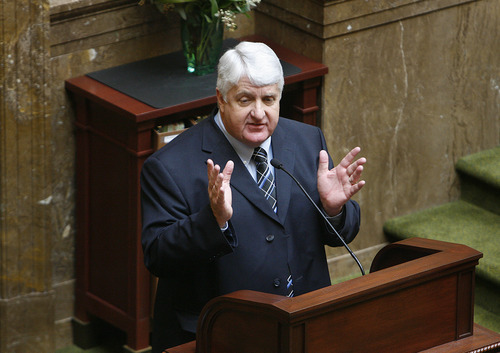This is an archived article that was published on sltrib.com in 2012, and information in the article may be outdated. It is provided only for personal research purposes and may not be reprinted.
Gov. Gary Herbert said he supports a proposal demanding that Congress relinquish control of federal lands within Utah and suing for damages if it does not comply.
Herbert said the federal government agreed to sell off its holdings in the state when Utah was granted statehood, with 5 percent of the proceeds going to schools. He said it has failed to live up to its bargain.
"The federal government needs to answer the question: 'Why have you not disposed of the property?' " he said during his monthly KUED news conference. "It's been to our economic detriment, and we ought to get an answer to that and if that means we go to court, ultimately, then so be it."
Several Republican legislators are proposing a package of bills that would demand the federal government relinquish about 33 million acres in the state — about two-thirds of the entire landmass — and set a deadline of the end of 2014 to comply.
If Congress fails to act, the lawmakers are seeking $3 million to launch a legal battle to force the federal government to pay damages.
"They've just decided unilaterally that they're going to breach the contract," Herbert said. "We ought to find out why and if there's some compensation they should give to us for that breach of contract."
An environmental group attorney says the scheme buys into a fantasy.
"The governor — in supporting this flatly unconstitutional, hair-brained schemed — has jumped down the rabbit hole with the Legislature," said Steve Bloch, with the Southern Utah Wilderness Alliance. "There has been no breach of contract. The federal government has not broken its word to the state. Utah gave up its claim to these lands when it willingly entered the union. Public lands in Utah like the Wasatch Mountains, Desolation Canyon, Zion National Park belong to all Americans, not just the state's far right wing."
Herbert said not having access to so much federal land has undermined Utah's tax base and hampered economic development.
Rep. Ken Ivory, R-West Jordan, the sponsor of one of the bills, said it could bring billions in revenue to the state and help Utah's last-in-the-nation education funding.
The bills were approved by a House committee this week and are awaiting a vote by the full body.
Under Ivory's bill, the federal government would have to relinquish control of the national parks as well. The state would then determine what type of mining, oil and gas development, logging, grazing and other uses would be allowed before returning them to the federal government.
Herbert said he doesn't believe Utahns support development in the national parks or wilderness areas.
Legislative attorneys have cautioned that there is a "high probability" that the laws would be deemed unconstitutional, since Utah explicitly surrendered the land when it was granted statehood and the Constitution and court precedents give Congress the right to manage that land.
"It's debatable whether its constitutional or not," Herbert said, "and again we have difference of opinion."
But he pointed to an example in which Utah passed legislation resisting enactment of federal health reform — which attorneys also said was likely unconstitutional — but gave the state standing to challenge health reform in court.
"The fact that there's a constitutional note on it," Herbert said, "should not in itself disqualify us from moving ahead."
Twitter: @RobertGehrke





